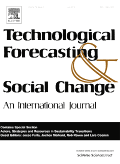
TECHNOLOGICAL FORECASTING AND SOCIAL CHANGE
Scope & Guideline
Connecting Technology with Social Evolution
Introduction
Aims and Scopes
- Technological Innovation and Its Impact:
The journal emphasizes the examination of technological innovations and their effects on various sectors, including healthcare, energy, and agriculture. It investigates how these innovations can foster economic growth, improve efficiency, and contribute to sustainability. - Interdisciplinary Approaches:
Research published in this journal often employs interdisciplinary methodologies, integrating insights from fields such as economics, sociology, environmental science, and management. This approach helps to understand the multifaceted impacts of technology on society. - Sustainability and Environmental Impact:
A significant focus is placed on the role of technology in promoting sustainability and addressing environmental challenges. Studies often analyze the effectiveness of green technologies and policies in reducing carbon emissions and enhancing resource efficiency. - Digital Transformation:
The journal explores the implications of digital transformation across industries, analyzing how digital technologies reshape business models, consumer behavior, and organizational practices. - Socio-Technical Systems:
Research in this journal frequently addresses the socio-technical dimensions of innovation, examining how social factors, governance, and institutional frameworks influence technological adoption and diffusion.
Trending and Emerging
- Artificial Intelligence and Machine Learning:
There is a growing body of research investigating the implications of AI and machine learning technologies on various sectors, including healthcare, finance, and supply chain management. This trend highlights the increasing integration of AI into business processes and decision-making. - Sustainability and Green Technologies:
Emerging studies are increasingly focusing on sustainability, particularly how technological innovations can contribute to environmental goals, such as carbon neutrality and resource efficiency. This reflects a broader societal shift towards sustainable practices. - Digital Economy and E-Governance:
Research is trending towards understanding the impacts of the digital economy and e-governance on economic performance and citizen engagement, particularly in the wake of the COVID-19 pandemic, which has accelerated digital transformation. - Blockchain Technology:
Blockchain is gaining attention not just for cryptocurrencies but as a transformative technology in various fields, including supply chain management, healthcare, and finance, emphasizing its potential for enhancing transparency and efficiency. - Social Innovation and Community Engagement:
There is an increasing focus on social innovation, particularly how technology can facilitate community engagement and address social issues. This trend aligns with a broader interest in the role of technology in promoting inclusive growth.
Declining or Waning
- Traditional Manufacturing Technologies:
Research related to traditional manufacturing processes has decreased as the focus shifts towards Industry 4.0 and smart manufacturing technologies. The transition to digital and automated processes is overshadowing older methodologies. - Linear Economic Models:
There is a waning interest in purely linear economic models, as the discourse increasingly embraces circular economy principles and sustainability-driven frameworks that consider environmental impacts. - Basic Technological Adoption Studies:
Studies focusing solely on the basic adoption of technologies without considering contextual factors, such as social influence or environmental impact, are becoming less prevalent as researchers seek more nuanced analyses. - Sector-Specific Innovations:
Research concentrating on isolated sector-specific innovations, such as those limited to one industry, has diminished in favor of cross-sectoral studies that emphasize interconnectedness and systemic changes. - Short-Term Forecasting Models:
The emphasis on short-term forecasting models has decreased, with a growing preference for long-term scenarios that incorporate broader socio-economic and environmental factors.
Similar Journals
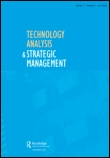
TECHNOLOGY ANALYSIS & STRATEGIC MANAGEMENT
Transforming Ideas into Impactful Strategies in Management.Technology Analysis & Strategic Management, published by Routledge Journals, Taylor & Francis Ltd, is a leading academic journal dedicated to advancing the fields of management science and strategic management. With an impressive impact factor and a strong editorial commitment since its inception in 1989, the journal has earned its place within the Q2 quartile rankings in both Management Science and Operations Research and Strategy and Management categories as of 2023. Notably, it ranks 34th in Decision Sciences and 88th in Business, Management, and Accounting, placing it in the top percentiles for research impact. Technology Analysis & Strategic Management offers a platform for researchers, practitioners, and students to explore contemporary challenges and innovations at the intersection of technology, strategy, and management, thereby addressing critical trends and contributing meaningful insights to the academic and professional communities. Although the journal is not open access, it maintains a strong commitment to disseminating important research findings, making it an essential resource for those seeking to enhance their knowledge and skills in the rapidly evolving landscape of technology and strategic management.
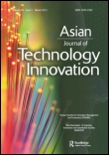
Asian Journal of Technology Innovation
Elevating the Discourse on Technology and InnovationAsian Journal of Technology Innovation is a reputable peer-reviewed journal published by Routledge Journals, Taylor & Francis Ltd, focusing on the critical intersection of technology innovation, economics, and management. With an ISSN of 1976-1597 and an E-ISSN of 2158-6721, this journal has carved a niche for itself since its inception in 2010, aiming to disseminate high-quality research that informs both academia and industry. Positioned in the second quartile (Q2) for both Economics and Econometrics and Management of Technology and Innovation, according to the latest rankings, it enjoys a solid reputation within the academic community, reflected in its Scopus rankings that place it in the 69th and 60th percentiles respectively. This journal is essential for scholars and practitioners looking to stay at the forefront of technological advancements and their implications for management and policy-making. With a commitment to fostering scholarly dialogue and innovation, the Asian Journal of Technology Innovation serves as a vital resource for those who are passionate about shaping the future of technology and its economic impact.

WORLD DEVELOPMENT
Exploring innovative solutions for a sustainable future.WORLD DEVELOPMENT is a prestigious peer-reviewed journal published by Pergamon-Elsevier Science Ltd, renowned for advancing the field of global development studies. Established in 1973, this influential journal dives deep into the interconnected realms of economics, sociology, political science, geography, and planning, aiming to provide critical insights and innovative solutions to complex global issues. With an impressive impact factor and a Q1 ranking across multiple disciplines, including Development and Economics and Econometrics, WORLD DEVELOPMENT ranks among the top journals in its field, ensuring high visibility and engagement for contributors. Researchers, professionals, and students engaged in development studies will find WORLD DEVELOPMENT an invaluable resource, as it publishes rigorous empirical research, theoretical discussions, and policy analysis that both informs and challenges prevailing paradigms. The journal remains committed to fostering a comprehensive understanding of development processes worldwide, making it an essential platform for knowledge exchange in this critical domain.

International Journal of Global Warming
Illuminating the Path to Environmental SustainabilityWelcome to the International Journal of Global Warming, a pioneering publication dedicated to advancing knowledge in the crucial fields of global warming, climate change, and environmental policy. Published by INDERSCIENCE ENTERPRISES LTD, this journal serves as an essential platform for interdisciplinary research, examining the multifaceted impacts of global temperature rises on our planet. Since its inception in 2009 and continuing through to 2024, the journal has fostered a vibrant scholarly community, despite currently being indexed in the Q4 quartile for Atmospheric Science and Global and Planetary Change. The journal's unique focus allows researchers, professionals, and students to engage with critical data and innovative methodologies in environmental management, monitoring, and legal policy responses. Submissions are invited from scholars worldwide, though the journal is not open access, ensuring a selective and quality-driven publication process. Beyond its academic contributions, the International Journal of Global Warming plays a significant role in shaping discussions about climate resilience and sustainability practices, making it a vital resource in today's pressing environmental discourse.

JOURNAL OF EVOLUTIONARY ECONOMICS
Transforming economic understanding through evolutionary insights.JOURNAL OF EVOLUTIONARY ECONOMICS, published by SPRINGER, serves as a critical platform for the dissemination of innovative research in the dynamic field of evolutionary economics. With an ISSN of 0936-9937 and an E-ISSN of 1432-1386, this journal has been at the forefront of exploring the intricate relationships between economic systems and evolutionary theory since its inception in 1991. As of 2023, it proudly holds a Q2 ranking in both the Business, Management and Accounting (miscellaneous) and Economics and Econometrics categories, illustrating its significant contribution to these domains. With a Scopus ranking of #260/716 in Economics and Econometrics and #93/218 in General Business, Management and Accounting, JOURNAL OF EVOLUTIONARY ECONOMICS is essential for researchers, professionals, and students keen on understanding the complex interplay of economic evolution and innovation. Although it does not offer Open Access options, its robust impact in shaping economic discourse makes it a vital resource for advancing knowledge and scholarship.

International Journal of Innovation and Sustainable Development
Driving Solutions for Tomorrow's Sustainable ChallengesThe International Journal of Innovation and Sustainable Development, published by INDERSCIENCE ENTERPRISES LTD, is a pivotal platform for researchers, professionals, and students interested in areas such as management of technology and innovation, as well as renewable energy and sustainability. Since its inception in 2005, this journal has aimed to disseminate high-quality research that addresses the urgent challenges of innovation in the context of sustainability. Located in the United Kingdom with an outreach extending to a global audience, the journal features a diverse range of articles aimed at fostering interdisciplinary collaboration. With an increasing importance in today’s rapidly evolving societal and environmental landscape, this journal provides essential insights and advancements in its fields of study, which are crucial for informed decision-making and policy formulation. Although currently placed in the lower quartiles of its categories, the journal still plays an essential role in nurturing new ideas and facilitating discussions that can lead to impactful advancements in innovation and sustainability.
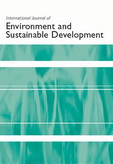
International Journal of Environment and Sustainable Development
Bridging research and real-world environmental challenges.The International Journal of Environment and Sustainable Development, published by INDERSCIENCE ENTERPRISES LTD, serves as a vital platform for researchers, practitioners, and policymakers engaged in the multidisciplinary fields of geography, renewable energy, and environmental sustainability. With an ISSN of 1474-6778 and an E-ISSN of 1478-7466, this journal has been disseminating critical research since its inception in 2002 and continues to expand its scope through 2024. Recognized within the Q3 quartile in Geography, Planning and Development and Q4 in both Management, Monitoring, Policy and Law and Renewable Energy, Sustainability and the Environment, it provides valuable insights into contemporary issues affecting our planet. While access options are limited to non-open access formats, the journal remains essential for those seeking to enhance their understanding of sustainable development practices and policies in a global context. The International Journal of Environment and Sustainable Development is not only an academic repository but also a catalyst for dialogue and innovation within the environmental sciences.

Revista Tecnologia e Sociedade
Fostering Interdisciplinary Insights for a Technological TomorrowRevista Tecnologia e Sociedade, published by UNIV TECNOLOGICA FED PARANA-UTFPR, stands as a significant platform for interdisciplinary research in the fields of technology and society. Since its inception as an Open Access journal in 2005, it has aimed to foster critical discussions and innovative studies regarding the implications of technology on social interactions, economic development, and cultural transformations. Housed in vibrant Curitiba, Brazil, this journal is dedicated to making high-quality research accessible to a global audience, attracting contributions from both emerging and established scholars. Although the journal's H-Index and specific categorization data are yet to be defined, its commitment to scholarly rigor and relevance underscores its importance in the evolving discourse on technology's role within society. With an emphasis on practical applications and theoretical advancements, Revista Tecnologia e Sociedade invites researchers, professionals, and students to explore the intersection of these dynamic fields and to contribute meaningful insights that propel understanding and innovation.
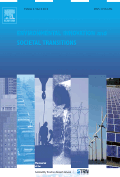
Environmental Innovation and Societal Transitions
Shaping Tomorrow's Sustainability Through Today's ResearchEnvironmental Innovation and Societal Transitions, published by ELSEVIER, stands as a leading academic journal in the fields of Environmental Science, Renewable Energy, and Social Sciences. With an impressive impact factor and ranking in the 98th percentile in Social Sciences and 96th percentile in Environmental Science, this journal is recognized for its rigorous peer-reviewed articles that contribute significantly to the discourse on sustainability and technological advancements. Established in 2011, it embodies the dynamic interplay between environmental innovation and societal adaptation, making it crucial for researchers, professionals, and students dedicated to understanding and shaping sustainable futures. The journal's commitment to high-quality research is evidenced by its placement in the Q1 category across multiple disciplines, asserting its pivotal role in advancing knowledge and practical solutions in these critical areas of study.
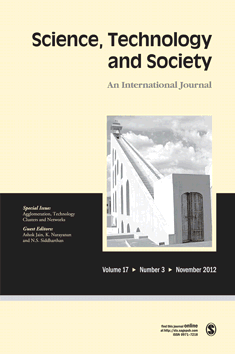
Science Technology and Society
Advancing Dialogue on Science and SocietyScience Technology and Society is a premier multidisciplinary journal published by SAGE Publications India Pvt Ltd, focusing on the intersection of scientific advancements and societal implications. With its ISSN of 0971-7218 and E-ISSN of 0973-0796, the journal is recognized for fostering scholarly discourse and critical analyses from diverse perspectives, serving as a vital resource for researchers, professionals, and students alike. With a distinguished Q1 category ranking in the multidisciplinarity discipline and an impressive 79th percentile among 171 journals, it stands out for its rigorous peer review process and impactful contributions to the field. The journal has been in continuous publication from 1996 to 2004 and from 2006 to 2024, underlining its ongoing relevance and commitment to exploring how technology shapes society and vice versa. Although currently offering subscription access, it remains dedicated to providing researchers with innovative insights that bridge gaps between technology and social contexts, making it an essential addition to the academic community's libraries.